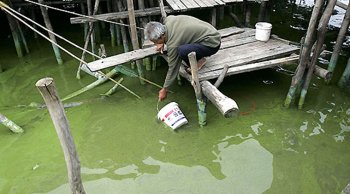
Environmental Protection laws in india
 A fisherman fetches water affected by blue-green algae in Lake Tai, in Wuxi, China’s Jiangsu province. (Source: AP/file)
A fisherman fetches water affected by blue-green algae in Lake Tai, in Wuxi, China’s Jiangsu province. (Source: AP/file)
China’s top legislature on Monday reviewed a draft amendment to the Marine Environment Protection Law, imposing more severe penalties for pollution.
The draft, submitted by the State Council to the National People’s Congress (NPC) Standing Committee’s bi-monthly session, echoed the central leadership’s recent emphasis on “conservation culture”, according to the NPC Environment and Resources Protection Committee.
The amendment adds provisions on marine ecological compensation and changes some articles that must be compatible with the new Environmental Protection Law, which took effect last year, Xinhua news agency reported citing a statement from the committee.
Minister of Land and Resources Jiang Daming said at the opening meeting that the law enhances penalties for actions that cause marine environment pollution by eliminating the fine’s upper limit of 300, 000 yuan ($44, 840) and imposing fines of up to 20 to 30 per cent of direct losses caused by pollution.
The amended law would impose restrictions on development in sea areas that have not met the target for environmental protection or whose major pollutant discharge has surpassed the standard amount, Jiang said.



















